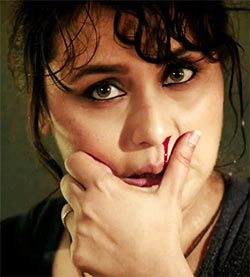 Faux feminism aside, Mardaani is mostly a middling action thriller, writes Sukanya Verma.
Faux feminism aside, Mardaani is mostly a middling action thriller, writes Sukanya Verma.
'Jis duniya mein maa-behne rishte nahi gaali hain, uss duniya se maryada ke rishte saare todungi,' screams an eye-catching tagline of Mardaani’s poster.
You’d think there’s a point behind this relatable sentiment? But no, five minutes into the film and Rani Mukerji barges into a goon’s house and hurls a no-holds-barred expletive at the concerned.
Sometime later, she cusses at another in the same vein.
The words ‘Maa’ and ‘bahen’ feature alternately. I don’t need to elaborate in what context.
Director Pradeep Sarkar’s latest offering is keen to project itself as a thought-provoking woman-oriented subject sensitive to the escalating rate of human trafficking by centring its entire story around a lady cop.
What it really is though but a middling action thriller engaging a cat-and-mouse game between a shrewd crime branch officer (who happens to be a woman) and a demented young man running a vast human trafficking business.
Just imagine a bland version of Liam Neeson’s Taken starring a screwy villain, who conveys a disturbing degree of both calm and quirk fashioned in the mould of another Hollywood script.
Mardaani travels between Mumbai and Delhi to unravel a kidnapping case assigned to senior inspector Shivani Shivaji Roy (Mukerji), who discovers some potentially whistleblowing information.
Shivani doesn’t completely fit the standard ‘no-nonsense cop’ description. When her superior reprimands her on the phone for conducting a reckless raid, she jokes, 'Arre koi boss ki biwi ko shopping karwao.'
She’s not much for subtlety either -- not batting an eyelid before reminding a flower-seller girl she rescued, how her uncle would have sold her off if it weren’t for Lady Singham.
And like last week’s Rohit Shetty sequel, this too has a scene featuring a evildoer getting thrashed while the cop rattles off a list of Indian penal codes. This time, the background score isn’t as ear splitting but amply indicative of the sequence’s crowd-pleasing tone.
When the aforementioned girl goes missing, Shivani goes on a wide scale hunt/trail while communicating with the offender (Tahir Bhasin) on the phone.
The moment where she challenges to catch him within 30 days holds up a genuine opportunity for a fascinating dialogue between good versus evil. But it is wasted for juvenile sledging and clunky dialogues (Gopi Puthran) like, ‘Under-19 team ka baravah khiladi/Kya ada kya jalwe tere Paro?’
The A-certificate is accounted for unsettling glimpses of life in the flesh trade and liberal use of swearwords by Rani but Mardaani like most so-called realistic films fails to convince it’s not for effect. Case in point: a minor is forced into intercourse by an old foreigner and a close-up of her misery cuts to a lingering shot of a symbolic white lily.
At its crisp pace (Sanjib Datta) of less than two hours, Mardaani is harmless if not hard-hitting viewing and tries to cram up as many elements -- political-criminal nexus, Nigerian drug links, flesh-auction clubs and an Abbas-Mastan-inspired twist till its arrives to its convenient finish.
Figuring in practically most scenes from start to finish, this is Rani’s show. It’s not her best performance but the actress exudes bullish toughness and refrains from making the same mistakes she committed in No One Killed Jessica.
Underplaying her gutsy, rough-talking Shivani gives her character a slyness, which is not enough to distract us from her perfectly falling bangs (Rangeela's Steven Kapoor would approve), salon-ready plaits and curled-up eyelashes but ceases to matter if you view Mardaani like a glamorous not gritty thriller.
Jisshu Sengupta, who plays Rani’s doctor husband, has two lines (Happy Birthday, Chhodna mat saalon ko) and one important scene where you can barely see his face. Bottom-line, he doesn’t even register. Her on-screen nemesis fares much better.
The eerie nonchalance of Tahir Bhasin’s voice and the gruesomeness it means to achieve complements his equally loathsome smile. What makes him so real (and hence creepy) is how just-around-the-corner he seems.
Contrary to what its title suggests, gender is never brought up in Mardaani to make a point. There’s no verbal validation from Rani’s character to assert her strengths or her weakness because she’s of a certain sex.
If only the script weighed more in intensity of thoughts than stagy heroics and simplistic resolutions, it could do a lot more for women in the film industry if not society in general.
Rediff Rating: 











 © 2025
© 2025